- Home
- Conn Iggulden
The Field of Swords Page 31
The Field of Swords Read online
Page 31
As if that wasn’t enough, Brutus seethed inwardly at Mark Antony being given control of the legions waiting behind them. He could accept the fact that Julius wanted Brutus and Octavian with him to control the extraordinarii, but Mark Antony had not earned the right to be Julius’s second-in-command. Brutus was in a savage temper as he wheeled his mount to respond to a commotion behind him.
“Gather up your reins, by Mars, or I will have you whipped!” he shouted to an unfortunate, milling group of triarii. In their heavy armor, they sat their horses like clanking sacks of corn, and Brutus rolled his eyes as another leaned too far forward and slipped from sight under his pony’s legs with a crash.
It was no way to approach a possible battle. The Tenth were used to the rhythms of foot soldiers, and the sweating, swearing men around him had nothing of the calm he was used to.
Octavian cantered past him, using his powerful gelding to force a wobbling rank of ponies back into line. The two men exchanged glances as they passed, and Octavian grinned, clearly amused by the situation. Brutus gave no answering smile, instead cursing the Tenth under his breath as two horses somehow became joined together ahead of him, their riders heaving at the reins until the tortured ponies panicked and bolted. Brutus caught them with a quick dart, holding on until the legionaries had regained control. They could not be expected to have the casual balance of thousands of hours of training, and he only hoped Julius would have the sense to call a halt long before Ariovistus could see their lack of skill. For men born in the saddle, there could be no deception.
Before they had set off, Julius had come to him. He had seen Brutus’s coldness and spoke to reassure him.
“I must have you with me, Brutus,” he had said. “The extraordinarii are the only competent riders I have and they are used to your orders.”
Julius had stood close to him then, unwilling to be overheard.
“And if I am forced to fight, I do not want Mark Antony at my side. He thinks too much of this Ariovistus and his friendship with Rome.”
Brutus had nodded, though the words did not go far to appease his sense of betrayal. The post was owed.
The outriders saw the Hand and reported back before noon. As the Tenth neared the crag, Brutus could see thousands of horsemen in perfect ranks ahead. They had chosen a place for the meeting where cavalry were hampered by steep defiles on either side. The rock they called the Hand formed the highest point to the east, with the western side choked with dense forest. Brutus wondered if Ariovistus had men hidden in the dark oaks. He knew he would have placed them there and hoped the legions were not heading into a trap. One thing was certain, if it came to a retreat against those German riders, the Tenth would have to accomplish it on foot or be destroyed.
The cornicens sounded a dismount, a signal of two tones they had agreed on before leaving the camp. With relief, Brutus saw the Tenth lose their awkwardness as they touched the ground.
Only the extraordinarii stayed in the saddle to guard the flanks. The Tenth walked their ponies forward in grim bad humor. Brutus continued to harry them, calling out to the centurions to keep order as they advanced toward the meeting place and the king of the Germanic Suebi. The tension grew as they marched closer to the enemy, and Brutus could see the details of the men they faced. He saw Ariovistus for the first time as the king rode out with three others and halted two hundred feet from his front line. Julius went forward to meet him with Domitius and Octavian, the tension visible in their stiff backs.
Brutus took a last look at the ranks of the Tenth.
“Be ready!” he called as he trotted out to join his general.
The noise of four thousand nervous horses dwindled behind them as he joined Domitius and Octavian, all three resplendent in their silver armor. Julius wore the full-face helmet, and when he turned in the saddle to acknowledge Julius, Brutus saw the effect of the cold features that stared back at him.
“Now let’s see what this little king has to say to me,” Julius’s voice came from beneath the iron mouth.
The four men kicked their horses into a canter in perfect formation as they moved across the broken ground.
Julius recognized Redulf at Ariovistus’s right shoulder and saw with astonishment that the other two warriors with the king were as strangely deformed as the messenger. One of them was shaven bald, but the other had a crown of black hair that did nothing to disguise the strange double ridge, as if some great fist had gripped his skull and squeezed it. They were all bearded and fierce looking, clearly chosen for strength. All were adorned with gold and silver, making Julius pleased he had his sword tourney finalists as his honor guard. The perfect sets of silver armor outshone the Suebi warriors, and Julius knew that, man for man, his companions would be more deadly.
Ariovistus himself did not have the ridged brow of the warriors at his side. His face was dominated by dark eyebrows and an untrimmed beard that covered most of his face, leaving only the cheeks and forehead clear. His skin was pale and the eyes that glowered at Julius were as blue as Cabera’s. The king remained perfectly still as Julius rode up and halted without saluting.
The silence held as Julius and the king regarded each other, neither willing to be the first to speak. Brutus looked behind them to the ranks of horses and still farther to where a greater force marked the southern tip of the lands Ariovistus had taken, fifteen miles down from the wide Rhine River. In the distance, Brutus could see two fortified camps that could have been twins of the Roman style. The mass of Suebi riders were not in formal array, but Brutus could see they had cleared the ground and could leap into a charge at short notice. He began to sweat as he saw the long spears they carried. Every man of the Roman infantry knew horses would not charge a shield wall any more than they could be forced to run into a tree. As long as the legions could hold their squares, they could advance through the forces of Ariovistus without real danger. The theory was little comfort in the face of so many of the pale, bearded warriors.
Julius lost patience under the calm scrutiny of the king.
“I have come to you as you asked, friend of my city,” he began. “Though this is not your land, I have ridden to it and honored your terms. Now I tell you that you must remove your armies across the natural barrier of the Rhine. Remove them immediately and there will be no war between us.”
“This is Roman friendship?” Ariovistus snarled suddenly, his voice a bass boom that startled them. “I fought against your enemies ten years ago and the title was given to me, but for what purpose? So that I can be turned away from lands I have rightfully won as it suits you?” His teeth were deeply yellow in his beard and his eyes glinted under the heavy brows.
“It was not the right to take whatever lands you wanted,” Julius retorted. “You have your home across the river and that is enough. I tell you, Rome will not allow you to have Gaul, or any part of it.”
“Rome is far away, General. You are all that represents your city in this place, and you have never known the fury of my white soldiers. How do you dare to speak to me in this way? I rode in Gaul when you were no more than a child! What lands I have won are mine by right of conquest, by more ancient law than yours. They are mine because I have shown the strength to hold them, Roman!”
The angry rumble caused Julius’s horse to shy nervously, and Julius reached down to pat the gelding’s neck. He controlled his temper to reply.
“I am here because you were named friend, Ariovistus. I honor you for my city, but I tell you again, you will cross the Rhine and leave the lands of Rome and Roman allies. If you live by right of conquest, then I will destroy your armies by the same right!”
Julius felt Brutus shift uncomfortably in the saddle on his right shoulder. The meeting was not going as he had intended, but the arrogance of Ariovistus nettled him.
“And what are you doing, Caesar? By what right do you take the lands of the tribes from them? Were they given to you by your Greek gods perhaps?” Ariovistus sneered as he raised his hands and gestured at the ver
dant countryside around them.
“You had answer enough when I sent back your messengers with empty hands,” he went on. “I want nothing from you or your city. Go on your way and leave me in peace, or you will not live. I have fought for these lands and paid the blood price. You have done nothing but send a pack of Helvetii scavengers back to their homeland. Do you think that gives you the right to deal with me as an equal? I am a king, Roman, and kings are not troubled by men like you. I do not fear your legions, particularly those riders behind you, who cannot even keep their mounts still.”
Julius resisted the urge to look behind him, though he could see the perfect ranks of the Suebi and knew there would be nothing like such a calm order in his own lines. Under his mask, he flushed, relieved that it could not be seen.
“I am Rome,” Julius said. “In my person you address the Senate and the people. You insult my city and all the countries under our rule. When you—”
Something whirred over their heads from the Suebi lines, and Ariovistus cursed. Julius looked up to see a dozen long shafts arc toward his precious Tenth and turned savagely to Ariovistus.
“This is your discipline?” he snapped.
Ariovistus looked as furious as he was himself and Julius knew he had not ordered the attack. Both armies stirred restlessly and another single arrow looped over them.
“My men are eager for war, Caesar. They live to bathe in blood,” Ariovistus growled at him. He looked over his shoulder at his men.
“Go back to them and we will come for you,” Julius said, his voice hollow with finality under the mask. Ariovistus faced him and in his eyes Julius saw a glittering fear. It didn’t match anything he had seen so far, and Julius wondered at the reason.
Before the king could answer, another flight of arrows whined overhead and Julius wheeled his horse away, crying “Ha!” to force a gallop back to his lines. Brutus, Domitius, and Octavian went with him, pounding over the ground. Behind them, Ariovistus too dug in his heels and his men sent up a great cheer as they saw him return to them.
Julius issued a flurry of orders as he came back to the Tenth. The fastest of the extraordinarii galloped south to Mark Antony with instructions to make all speed in support. Others were sent into the forest to the west, to scout for hidden archers or a surprise force. The Gaulish ponies were taken to the rear and the Tenth were free at last of their distraction. They formed a huge defensive square, with shields overlapping against a cavalry charge. Spears were readied and arrows fitted to the sinew bowstrings. The front rank waited patiently to repel the first charge.
It did not come. To Julius’s surprise, Ariovistus vanished deep within the mass of horsemen and suddenly they began to retreat in perfect order. Some of the Tenth shouted and jeered at them, but the scouts were not back from the woods to the west and Julius was not about to risk an advance without knowing who lurked in those green depths.
Ariovistus took his men out of spear and then arrow range before halting once more. Though there were clearly hotheaded youngsters in the Suebi lines, they showed their discipline in the retreat, with sections of them covering others as they moved back.
“What’s his game?” Brutus muttered at Julius’s side. “While he delays, he must know our legions are coming up behind us.”
“He may mean to draw us in. I don’t like the look of those woods,” Julius replied.
As he spoke, the first of his scouts galloped back to the Roman lines.
“Nothing, sir,” the man panted as he came close and saluted. “No tracks or old fires and no sign of any force in hiding.”
Julius nodded, suddenly remembering the last time he had taken a scout’s report without corroborating it.
Two more of his riders came out of the trees and reported before Julius was satisfied and baffled by the situation. Ariovistus had acted as if he were about to launch a wild charge, but his men stood with stolid indifference, unmoved by the beckoning gestures of the Tenth front line.
Julius tapped his fingers irritably on his saddle. Had they trapped the ground perhaps? It seemed unlikely. Spiked pits would be more of a hindrance to their own army while they outnumbered the single Roman legion.
“Shall we wait for Mark Antony?” Brutus asked.
Julius calculated the time it would take for the legions to reach his position and let out a sharp breath of frustration. It would be hours before they were there to support him.
“Yes. There is something here I do not understand. Their forces are swift and together they outnumber us perhaps two to our one. Ariovistus should attack unless he was bluffing, though I can’t see how he could have been. I will not risk the lives of my Tenth on a trap until we are supported.”
The soldiers who heard this exchanged pleased glances, though Julius didn’t see it as he stared toward the enemy. A commander who looked after his men was a valuable one, as far as they were concerned.
The horsemen of the Suebi stood silently a thousand paces from the Tenth, and a fly buzzed around Julius’s face as he looked over their lines.
“Stand ready, gentlemen. For now, we wait.”
By the time the vast column of legions had joined the Tenth, Ariovistus too had summoned his main force. At the best estimate of the scouts who dared the darts and arrows of the enemy horsemen, there must have been sixty thousand of the Suebi warriors. Each rider brought a running soldier, keeping up a terrific pace as one hand gripped the mane of the horse he ran alongside. Julius was reminded of the Spartans running to battle in the same way and hoped he would not face opponents of a similar caliber. Brutus had made a wry remark about the battle of Thermopylae, remembered from their tutors years before, but the Spartan king had been able to defend a narrow pass in mountains, whereas Julius could be flanked or even surrounded by such a mobile force. A better model was the battle of Cannae, he thought, where the Romans had been annihilated, though he did not voice the worry aloud.
Two hours after noon, Julius had his sixteen scorpion bows set up and pointing toward the enemy. They were perfect defensive weapons against a charge, but were so poorly maneuverable that they fell behind an advance after the first shots.
“I have never known a battle like this, Brutus, but they have waited too long now. Have Octavian protect our flanks with the extraordinarii. The rest is up to us.”
He chopped his hand down and all along the lines, cornicens blew their long horns in a single note that matched no order. The sound was intended merely to frighten the enemy, and Julius saw a restless shifting amongst the Suebi as they reacted to it. Moments later, the scorpions fired and bolts as long as a man blurred across the distance between them, faster than could be seen or avoided. Horses in the front lines were spitted, the great bolts continuing on to kill indiscriminately behind them. As the scorpion teams worked feverishly to reload, Julius signaled the advance, and with the Tenth at their head, the legions began their loping run toward the enemy, spears ready in their hands. Though they moved quickly, no man left his position, and if the Suebi charged them, they could form impregnable squares with barely a check to their pace.
With the perfection of discipline, the legions spread out as soon as they were through the pinch between the forest and the Hand. Brutus commanded the Third on the right flank and Mark Antony took the left.
As they came into range for archers, the men readied their shields, but without warning the Suebi lines began to move away once more, faster by far than the Roman advance. Thousands of warriors cantered clear and re-formed half a mile distant.
It was not too far, though Julius feared being drawn out onto the green fields. Ahead of him, he could see the first of the Suebi camps struggling to close its gates. Hundreds of cart drivers were in a panic as they tried to get in. Julius shook his head in amazement that Ariovistus had abandoned them.
Bericus detached to the west to handle the stockade, and another of the Ariminum legions moved smoothly up to the front to take the place of that five thousand. They swept past the stockade as Bericus to
ok the people there without fuss or bloodshed. Julius saw their arms raised in panic as he passed them, but the rest of the Suebi were once again on the move, the solid formations becoming liquid as they broke apart to re-form another half mile distant.
Julius signaled the halt and the legions crashed to a panting stop. Brutus came galloping in from the right wing.
“Let me take the extraordinarii. I can stop them long enough for you to bring up the rest,” he said, glaring at the enemy in the distance.
“No, I won’t risk the only good horsemen I have,” Julius said, casting an eye over the whooping, ragged-looking Aedui, overjoyed to be reunited with their ponies. “We are deep in his lands now. I want a hostile camp set up around the stockade as a base. I am not going to exhaust the men by charging all over Gaul after him. I want the legions behind camp walls and gates before nightfall. Have the ballistae readied when the carts come up behind us. Some hot food as well. I don’t know about you, but I’m starving.”
Julius looked over at the black mass of horsemen of the Suebi and shook his head.
“Ariovistus is no fool. There has to be a reason for this cowardice. When the camps are ready, summon my council to me.”
CHAPTER 29
_____________________
Building fortified camps under the very noses of the enemy was a new experience for the six legions. Every man who could be spared dug the outer trenches, throwing the loose earth up into great ramparts, shifting many tons of earth to the height of three men. The extraordinarii patrolled the perimeter, and twice during the long afternoon, small groups had ridden hard at them, sending javelins flying before racing back to their own lines. It had been no more than young men showing their courage, but Julius could make nothing of Ariovistus’s plans. His warriors seemed eager enough, but still the main army kept their distance, watching as the Romans raised earthworks and felled trees. Julius had smelled spices on the breeze as the day wore on and knew the Suebi were busy preparing food for their own men as he was about to do for his.

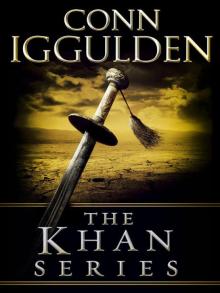 The Khan Series 5-Book Bundle
The Khan Series 5-Book Bundle Tollins 2: Dynamite Tales
Tollins 2: Dynamite Tales Tollins: Explosive Tales for Children
Tollins: Explosive Tales for Children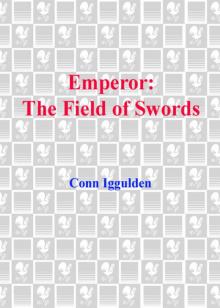 The Field of Swords
The Field of Swords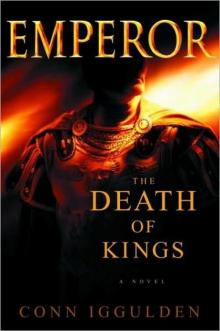 The Death of Kings
The Death of Kings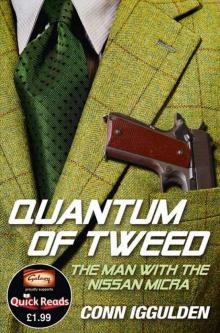 Quantum of Tweed: The Man With the Nissan Micra
Quantum of Tweed: The Man With the Nissan Micra Bones of the Hills
Bones of the Hills Genghis: Birth of an Empire
Genghis: Birth of an Empire The Gates of Rome
The Gates of Rome Dunstan
Dunstan Fig Tree
Fig Tree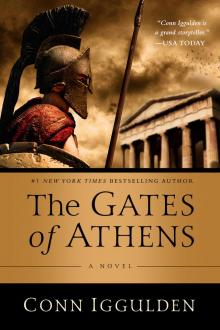 The Gates of Athens
The Gates of Athens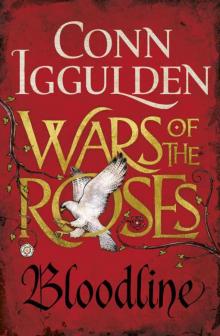 Stormbird
Stormbird Khan: Empire of Silver
Khan: Empire of Silver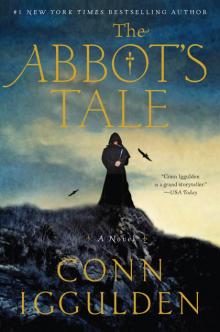 The Abbot's Tale
The Abbot's Tale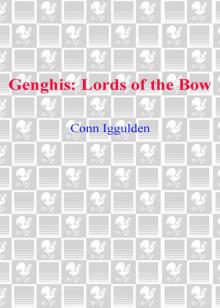 Gengis: Lords of the Bow
Gengis: Lords of the Bow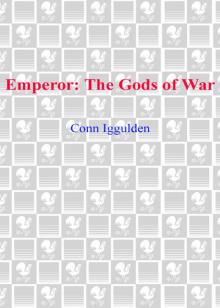 The Gods of War
The Gods of War Blackwater
Blackwater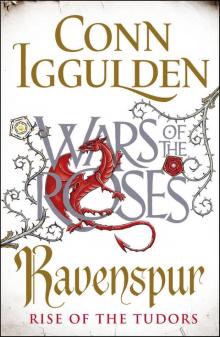 Ravenspur: Rise of the Tudors
Ravenspur: Rise of the Tudors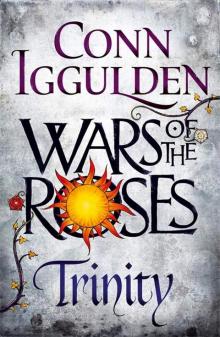 Wars of the Roses: Trinity (War of the Roses Book 2)
Wars of the Roses: Trinity (War of the Roses Book 2) The Gods of war e-4
The Gods of war e-4 The Dangerous Book of Heroes
The Dangerous Book of Heroes Stormbird wotr-1
Stormbird wotr-1 Emperor: The Death of Kings
Emperor: The Death of Kings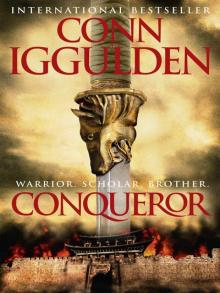 Conqueror (2011) c-5
Conqueror (2011) c-5 The Dangerous Book for Boys
The Dangerous Book for Boys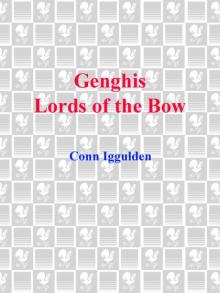 Genghis Lords of the Bow
Genghis Lords of the Bow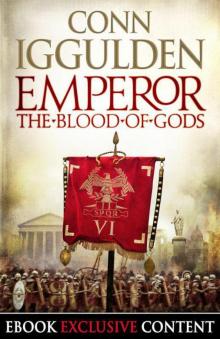 Emperor: The Blood of Gods (Special Edition) (Emperor Series, Book 5)
Emperor: The Blood of Gods (Special Edition) (Emperor Series, Book 5) The Emperor Series: Books 1-5
The Emperor Series: Books 1-5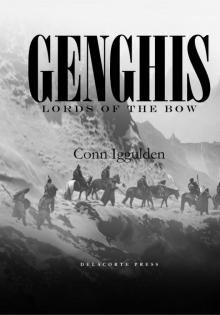 Lords of the Bow c-2
Lords of the Bow c-2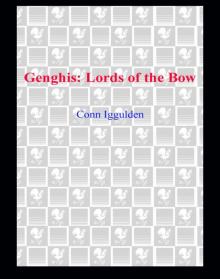 Lords of the Bow
Lords of the Bow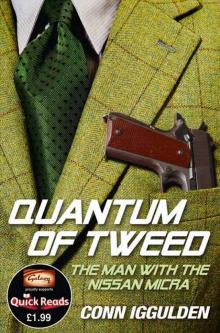 Quantum of Tweed
Quantum of Tweed Wars of the Roses 01 - Stormbird
Wars of the Roses 01 - Stormbird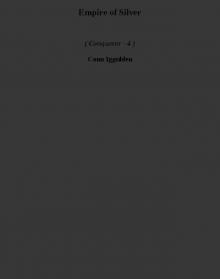 Empire of Silver c-4
Empire of Silver c-4 Birth of an Empire
Birth of an Empire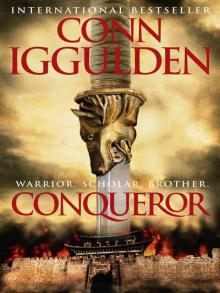 Conqueror (2011)
Conqueror (2011)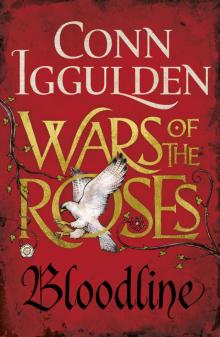 Wars of the Roses: Bloodline: Book 3 (The Wars of the Roses)
Wars of the Roses: Bloodline: Book 3 (The Wars of the Roses) Bones Of the Hills c-3
Bones Of the Hills c-3 Empire of Silver
Empire of Silver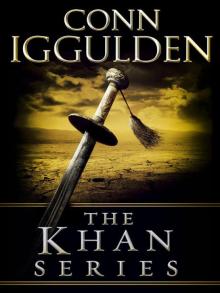 The Khan Series 5-Book Bundle: Genghis: Birth of an Empire, Genghis: Bones of the Hills, Genghis: Lords of the Bow, Khan: Empire of Silver, Conqueror
The Khan Series 5-Book Bundle: Genghis: Birth of an Empire, Genghis: Bones of the Hills, Genghis: Lords of the Bow, Khan: Empire of Silver, Conqueror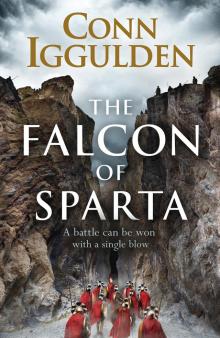 The Falcon of Sparta
The Falcon of Sparta Explosive Tales for Children
Explosive Tales for Children